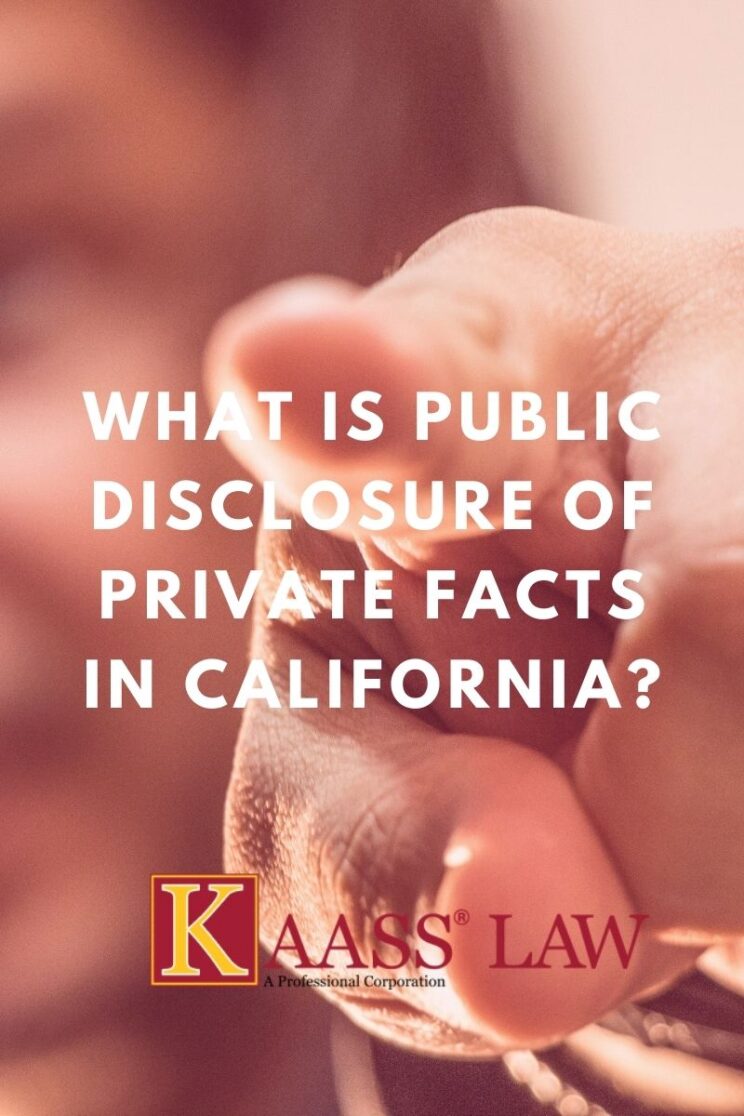The right to privacy has two key aspects:
- The general law of privacy, which affords a tort action for damages resulting from an illegal invasion of privacy
- The constitutional right of privacy, which protects personal privacy against illegal governmental invasion.
Invasion of privacy is tort-based, allowing a victim to bring a lawsuit against a person who illegally intrudes into their private life, publicizes them in a false light, discloses their private information, or appropriates their name for personal gain. In California, Public Disclosure of Private Facts is considered a form of invasion of privacy.
Elements of Public Disclosure of Private Facts: CACI 1801
According to CACI 1801 to prove the claim of violation of a right of privacy the plaintiff must be able to establish the following elements:
- Defendant publicized private information concerning the plaintiff
- A reasonable person in the position of the plaintiff would consider the publicity highly offensive
- Defendant knew or acted with reckless disregard of the fact, that a reasonable person in the position of the plaintiff would consider the publicity highly offensive
- Private information wasn’t of legitimate public concern
- The defendant’s actions caused direct harm to the plaintiff, resulting in physical, emotional, or financial damages.
- Defendant’s conduct was a substantial factor in causing harm to the plaintiff
To recover on a claim for invasion of privacy based on public disclosure of private facts, the plaintiff needs to show that the disclosed information was private and not of legitimate concern to the public, and that disclosure would be highly offensive to any reasonable person. Furthermore, the plaintiff must show that the disclosure of facts was actually public in nature. In addition, the defendant can’t be liable when he merely gives further publicity to information about a plaintiff that is already public.
Examples of Public Disclosure Include Publications In:
- Books
- Newspapers
- Magazines
- Motion pictures
- Radio or television broadcasts
Newsworthy Private Facts
A reasonable member of the community may consider a private fact newsworthy if they could entertain a legitimate interest in it. Generally, courts recognize that the public has a legitimate interest in almost all current events, even if it contains private information about participants. Additionally, the public has a legitimate interest in the private lives of notorious or prominent figures, such as professional athletes, actors, actresses, public officers, and noted inventors..
In deciding whether the information was a matter of legitimate public concern the following factors must be concerned:
- The social value of the information
- The extent of the intrusion into the plaintiff’s privacy
- Whether the plaintiff consented to the publicity explicitly or by voluntarily seeking public attention or a public office
Legal Defenses to a Public Disclosure of Private Facts Claim
- Plaintiff couldn’t manage to prove all the above-mentioned elements of the claim
- The disclosed facts were true gathered from public records
- The defendant had the prior consent of the victim to disclose the information
What is Not Considered a Breach?
It is important to understand that not every disclosure of information is automatically an invasion of privacy. For example, if the information disclosed is already in the public domain, it is not a violation of the law to disclose it.
In California, there is a principle that facts that have been previously published or are public knowledge cannot be the basis of a lawsuit. In addition, it has been held that when a person voluntarily discloses certain information to the public, he or she loses the protection of privacy with respect to that information.
Special Features of Cases Involving the Digital Environment
With the development of technology, the number of cases involving the publication of private information on the Internet has increased significantly. The digital environment sometimes makes it difficult to determine whether information has actually been made public. However, courts are increasingly recognizing online postings as sufficient grounds for a case.
For example, posting personal medical or financial information without the victim’s consent. Courts treat this type of conduct as a serious invasion of privacy, and individuals who engage in it may face civil liability, including potential lawsuits and financial penalties.
Damages a Victim Can Recover
The compensatory damages a victim can recover depend on the specific facts of a case. Here are some common examples of damages:
- Loss of reputation
- Damage to the trade or occupation
- Loss of business income as a result of the disclosure
Do you need additional information regarding a specific situation that you or a loved one face? KAASS LAW attorneys you should be able to provide you with legal assistance regarding the matter.
Ask for advice
If you suspect that your privacy rights have been violated, KAASS LAW is here to help. We will provide:
- Develop a defense strategy
- Represent your interests in court, if necessary
- A legal assessment of the situation


Pingback:Invasion of Privacy in California - KAASS LAW